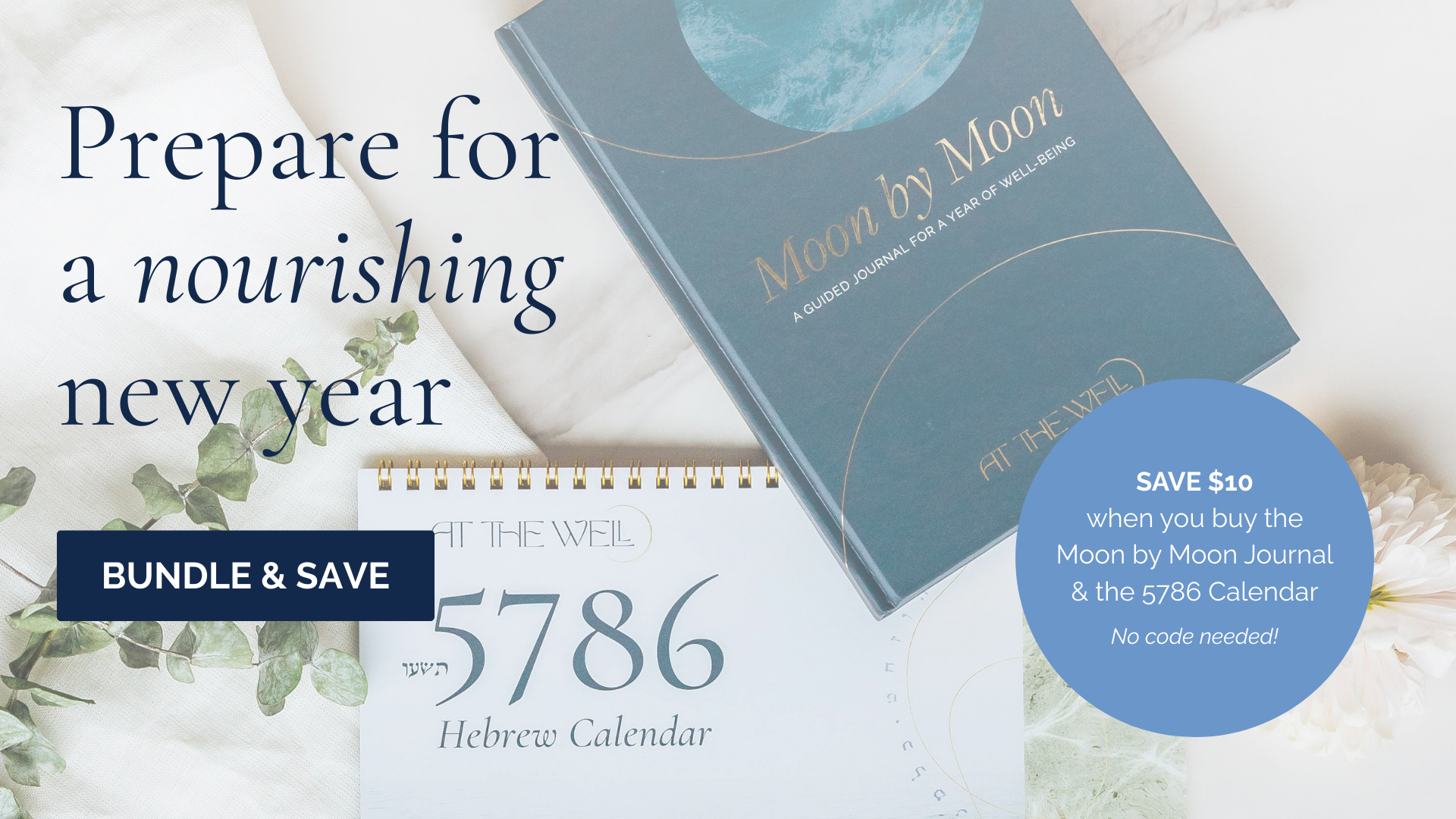As a kid, it was often confusing to me why most students had vacation for their holidays, and yet the holidays my family was celebrating were typically not on a break from school. I grew up going to a Reform synagogue in Milwaukee, WI, where I learned about the Jewish calendar, but I didn’t apply it to the rest of my life or retain it. I wasn’t convinced that the Jewish calendar was helpful to me at all.
My opinion started to shift in college, through an unexpected path: I began to learn about astrology with my friends. We explored the meaning of our birthdays and how the placements of the planets and the stars impacted our personalities, relationships, and energies we felt. (I am a proud Aries!) Allowing myself to understand the year beyond the confines of the Gregorian calendar gave me more confidence to explore other ways to understand the passage of time.
With this new confidence and a desire to connect more with Judaism, I decided to get the Hebrew calendar from At The Well. I hung it on my bedroom door, so I would see it as I entered and exited my room. I became more attuned to when the Jewish months were starting and ending, when Jewish holidays were, and when the new and full moons were.
Just as I used the astrological signs as guides for intention-setting throughout the year, I found meaning in being aware of the Jewish months and the various themes they reminded me to focus on that month. For example, the month of Nissan and the story of Passover, the Jews escaping from Egypt, reminds me to be bold and expansive in my sense of what's possible. Similarly, the full moon in Aries helps me embrace spontaneousness, assertiveness, and creativity.
I didn't know until I started to follow the Jewish calendar as an adult that it is based on the lunar and solar cycles. Each Hebrew month begins with a new crescent moon, and a leap month is added periodically to keep the months aligned in the same season of the solar year. As with my affinity towards astrology, I find meaning in connecting my being with the more-than-human world. We are all born at specific times when the sun and moon are in certain placements, yet we are all part of the same orbits. Being unique in our own birth times, and also being a part of a cycle we all experience, is grounding to me. I see this as a way to connect us to each other, even those we may never know.
By using the Jewish calendar more regularly, I feel more connected with Jewish communities who came before me and who will come after me. It's meaningful to me that my ancestors, many of whom I will never know, also used the Jewish calendar to mark time and as a guide for when to celebrate Jewish holidays. My mom’s side came from Ukraine and Germany before the Holocaust, and my dad’s side escaped from Poland, Germany, and Ukraine during the Holocaust. It is grounding to me to know that the rhythms of my life are influenced by the same lunar patterns that guided their celebrations and gave them strength.
Although it was confusing when I was younger, now I like that the specific dates of the Jewish holidays are changing in relation to the Gregorian calendar. A few years ago, I celebrated Tu B’Shvat for the first time as an adult at a Well Circle when I was living on Dakota Land in Minneapolis, MN. We did a small Tu B’Shvat Seder and ate yummy fruits and also shared our intentions for the month of Shvat. I found it to be magical to share intentions around growth and hope during the darkest and coldest part of the winter in Minnesota.
Although I always took the “secular” Gregorian calendar for granted, I came to realize that the history and structure of that calendar prioritizes Christianity — and therefore the decisions that individuals, communities, and organizations make based on that calendar are influenced by Christianity. Using the Jewish calendar means that I am making decisions that are in line with the history of Jewish communities and with the holidays I will celebrate. Using the Jewish calendar for me is a helpful tool for connecting to my ancestors, reclaiming this ancestral way of marking time, and finding meaning throughout the year.
At The Well uplifts many approaches to Jewish practice. Our community draws on ancient Jewish wisdom, sometimes adapting longstanding practices to more deeply support the well-being of women and nonbinary people. See this article’s sources below. We believe Torah (sacred teachings) are always unfolding to help answer the needs of the present moment.
What is Christian Hegemony? christianhegemony.org
Jewish Calendar: Solar and Lunar, My Jewish Learning

